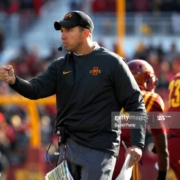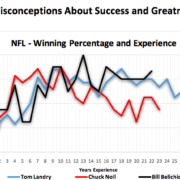Don’t judge me- I spent a lot of time at the Meadows Racetrack as a kid. My dad loved the horses, I loved my dad; therefore, I ended up loving the race track as well. By the time I was ten years old I could read a racing program with the best of them. I could tell you the best drivers (I went to harness horse races, they were drivers not jockeys) and trainers at the Meadows; in addition, I could tell you the difference between an exacta and an exacta box. As a ten year old, I wanted to grow up to be either Ozzie Smith or a horse race driver.
Amongst the cigar smoke and beer, a kid can learn a lot at the racetrack (for the record, I never saw my father take a drink of alcohol or smoke). Today, I will discuss the lessons I learned and how they apply to baseball and leadership.
1. Statistics can be misleading- There is a ton of information in a racetrack program- some people would spend an exorbitant amount of time analyzing the data. While it is important to look at the information, somethings can be misleading. For example, you could look at two horses and see one ran the last race in 2:00 and another horse ran it in 1:57. On the surface, it looks like you should go with the 1:57 minute miler. But what if horse A raced on a 1/2 mile track (which are typically slower) and horse B raced on a 1 mile track? Or, what if horse A has a more experienced driver this week- could that make a difference in its performance?
In baseball, we have become inundated with statistics and numbers. If we are not paying attention to analytics we are missing out on a great opportunity to help our programs. However, we cannot allow the numbers to paralyze us; especially in the college game. Most of the statistics we receive are numbers from the pro game. Call me “Johnny College Guy”, but if there are runners on 1st and 2nd with 0 outs, and we are down a run in the 9th, we will be bunting 99 out of 100 times. On a side note, if the same situation occurs in the 1st inning will be bunting 95 out of 100 times.
Just like evaluating horses, you must respect the numbers but also realize that they are…just numbers. Some of the best handicappers trusted their gut when “picking their ponies.” My advice in baseball (and business) is to gather as much information as possible and then make a bold, decisive decision. Numbers can lie.
2. Long Shots Can Win
If you go to the races long enough you will see a 30-1 shot win. No matter how poorly the horse performed in the past, how bad of a driver was leading them, or how great the competition- as long as you were in the race there was a chance.
At Marietta, we were always the hunted- it was like having a bullseye on your chest. We were a measuring stick for a lot of programs. During my years there we were beat by many “long shots.” I learned to always prepare regardless of what the competition looked like on paper. Coach Schaly and now Coach Brewer never “saved” a pitcher for another opponent. If your best pitcher was ready- he threw regardless of the situation. Those men knew that you could be beat on any given night.
At Denison, I learned what it was like to be the underdog. My experience at the track allows me to get excited to play the best teams regardless of what the match-up looks like on paper. We want to play the best teams and see their best pitchers. Games are not won or lost based on previous results unless you allow yourself to be beat mentally prior to the contest. If you are in the arena you have a shot; long shots can and do win. You must go into every battle expecting a positive result.
3. Pay Attention to the Bloodline
My dad always wanted to know the mother and father of the horse. He was a big believer that the physical and mental traits of the parents would eventually emerge in their offspring. Even if the horse failed to perform to date, dad would say, “His father was a competitor. He’ll be good one of these days.”
For the past two years we have tried to find players that are “good fits” for our program. However, you are not just recruiting the player you are also recruiting the family. As we all know, parents are involved in the lives of their children more than ever before. We want to make sure that the parents understand and share our vision for the baseball program. We explain our core principles and try to drive home that we are committed to playing who we believe are our best players. When it comes to playing time, it is never personal, it is a meritocracy. Our staff makes mistakes, my wife thinks I’m wrong with who we play and parents do as well; however, we are trying to put the team on the field that gives us the best opportunity for success. I believe this is critical to the health of your program. If the parents display red flags during the recruiting process there is a strong chance that problems will develop later. Our goal is to recruit motivated, young men from strong families.
4. It’s More about the Driver than the Horse
Year after year you would see the same drivers at the top of the standings for wins and winning percentage. Some people just had a knack for getting the most out of their horses. Oftentimes, the best drivers would be asked to drive two or three different horses in the race. Who they chose to drive would be a great predictor of who would win the race.
It seems like you see the same programs near the top of the standings every year. They graduate great players, lose assistant coaches, and injuries occur; however they still have successful campaigns (Ohio State football just provided us with a great example). I truly believe leadership is the most accurate predictor of success.
When I was younger, I believed that the drivers were successful because they had a gift- that they were simply blessed with the ability to win races. Now I know that like any great leader, chances are they developed this “gift” by tirelessly working on their craft.
Every life experience provides an opportunity to learn. At the time, being at the track meant spending time with my dad- there was nowhere I would have rather been. Who would have thought those “tutorials” would still be benefitting me today.
Be Outstanding,
Mike Deegan
Here is a link to a video of Will Smith sharing his secrets to success.





Leave a Reply
Want to join the discussion?Feel free to contribute!